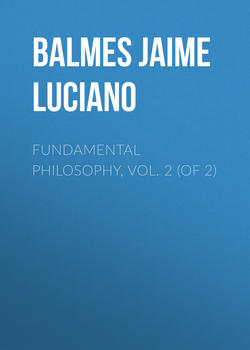Читать книгу Fundamental Philosophy, Vol. 2 (of 2) - Balmes Jaime Luciano - Страница 26
BOOK FOURTH.
ON IDEAS
CHAPTER XXVI.
REMARKS ON THE REAL FOUNDATION OF PURE POSSIBILITY
Оглавление162. Since the argument proving the necessity of a being in which is laid the foundation of all the relations in the possible order, is one of the most transcendental in all metaphysics, and at the same time one of the most difficult to be perfectly understood, we judge it advisable to enlarge somewhat upon the considerations thrown out in the preceding chapter.
An example, in which we undertake to establish the possibility of things, independently of a being in which is found the reason of all, will serve our purpose better than abstract reflections.
163. "Two circles of equal diameters are equal." This proposition is evidently true. Let us analyze its meaning. The proposition refers to the possible order, and abstracts absolutely the existence of the circles and of the diameters. No case is excepted; all are comprised in the proposition.
164. Neither does the truth refer to our mode of understanding; but on the contrary, we conceive it as independent of our thought. Were we asked, what would become of this truth were we not to exist, we should without hesitation reply that it would be the same, that it acquired nothing by our existence, that it would lose nothing by our extinction. If we believed this truth to depend in any way upon us, it would cease to be what it is, it would no longer be a necessary but a contingent truth.
165. Nor is the corporeal world indispensable to the truth and necessity of the proposition: on the contrary, if we suppose no body to exist, the proposition would lose none of its truth, necessity, or universality.
166. What would happen, if, withdrawing all bodies, all sensible representations, and even all intelligences, we should imagine absolute and universal nothing? We see the truth of the proposition even on this supposition; for it is impossible for us to hold it to be false. On every supposition, our understanding sees a connection which it cannot destroy: the condition once established, the result will infallibly follow.
167. An absolutely necessary connection, founded neither on us, nor on the external world, which exists before any thing we can imagine, and subsists after we have annihilated all by an effort of our understanding, must be based upon something, it cannot have nothing for its origin: to say this, would be to assert a necessary fact without a sufficient reason.
168. It is true that in the proposition now before us, nothing real is affirmed; but if we reflect carefully, we find even here the greatest difficulty for those who deny a real foundation to pure possibility. What is remarkable in this phenomenon, is precisely this, that our understanding feels itself forced to give its assent to a proposition which affirms an absolutely necessary connection without any relation to an existing object. It is conceivable that an intelligence affected by other beings may know their nature and relations; but it is not so easy of comprehension how it can discover their nature and relations in an absolutely necessary manner, when it abstracts all existence, when the ground upon which the eyes of the understanding are fixed, is the abyss of nothing.
169. We deceive ourselves when we imagine it possible to abstract all existence. Even when we suppose our mind to have lost sight of every thing, a very easy supposition, granting that we find in our consciousness the contingency of our being, the understanding still perceives a possible order, and imagines it to be all occupied with pure possibility, independent of a being on which it is based. We repeat, that this is an illusion, which disappears so soon as we reflect upon it. In pure nothing, nothing is possible; there are no relations, no connections of any kind; in nothing there are no combinations, it is a ground upon which nothing can be pictured.
170. The objectivity of our ideas and the perception of necessary relations in a possible order, reveal a communication of our understanding with a being on which is founded all possibility. This possibility can be explained on no supposition except that which makes the communication consist in the action of God giving to our mind faculties perceptive of the necessary relation of certain ideas, based upon necessary being, and representative of his infinite essence.
171. Without this communication the order of pure possibility means nothing: none of the combinations referable to it contain any truth: and this ruins all science. There can be no necessary relations if there be no necessity upon which they are based, and where they are represented; if this condition be wanting, all cognitions must refer to something actually existing; they are even limited to what appears, to what affects us, and they cannot affirm any thing beyond the actual order. Science, in this supposition, is unworthy of the name; it is nothing but a collection of facts, gathered together in the field of experience; we cannot say: "This will be, or will not be; this may be, or may not be;" we are necessarily limited to what is; or, rather, we ought to confine ourselves to that which affects us by simple appearances, and never be able to rise above the sphere of individual phenomena.
